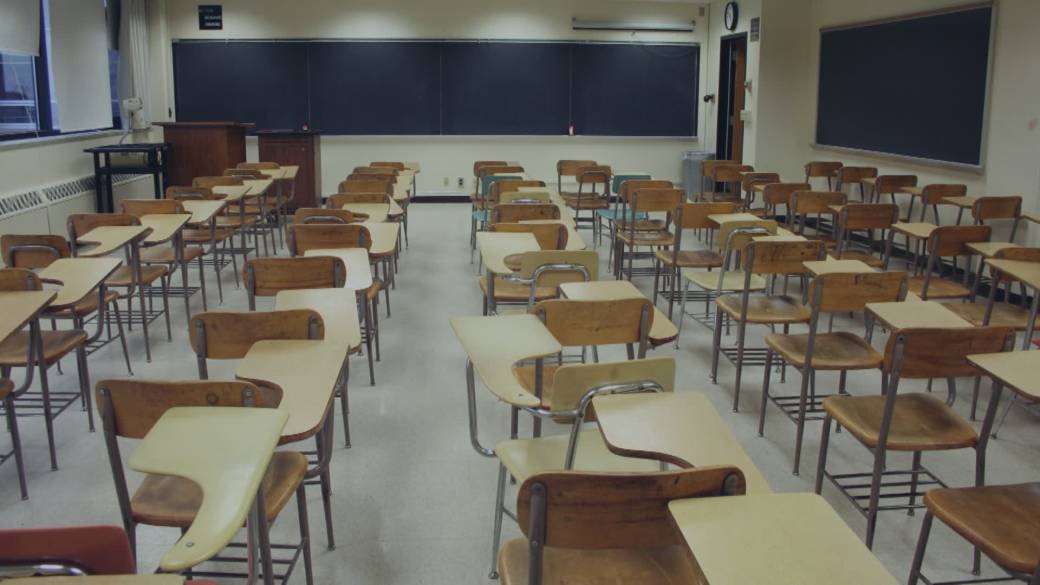Parents of kids at Caulfeild Elementary School in West Vancouver say it shouldn’t have taken a rogue Facebook group to get an understanding of the number of COVID-19 cases in a Grade 2 class there — but because they’re not getting the information they need from B.C. public health officials, they’re going to continue sharing it amongst themselves.

Sherrie Robinson told Global News that when parents first received a letter telling them there’d been an exposure, they felt there weren’t nearly enough details.
She said parents were left wondering if they should get their kids tested — including one mom, who fibbed to get her asymptomatic daughter tested.
“And if that was my kid, I’d be doing the same thing. And thank god she did, because it ended up being a positive,” she said.
That mom posted her family’s test results in a Facebook group called North Shore COVID19 Information.
“It got everyone thinking ok, you know, there’s this huge stigma around it. And I mean, her daughter was asymptomatic. She had no way of knowing,” Robinson said.
“So the conversation’s been started and now it’s like a ripple effect.”
Subsequent posts on the Facebook group revealed that at least half of the students in the class have possibly contracted COVID-19.
Parents have shared amongst themselves positive results in seven out of 15 children in one Grade 2 class — and they say some family members are getting sick, too. Robinson said she’s aware of three Caulfeild moms, a grandparent and a sibling at another school who’ve tested positive for COVID-19.
Robinson said there’s also frustration with the province, and Vancouver Coastal Health public health officials, for being adamant that the cases arising out of the Caulfeild exposure do not constitute an outbreak.

Provincial health officer Dr. Bonnie Henry was asked about the subject at a COVID-19 press briefing Thursday afternoon.
She said this isn’t considered an outbreak because kids were sent home and told to isolate early on.

Get breaking National news
“So it is likely that some of them will develop illness in that incubation period but they are not in the school setting when they get ill, so it’s not an outbreak,” Dr Henry said.
“There are no outbreaks across the province right now.”
Henry said there’s no evidence of ‘widespread transmission’ in the classroom anywhere in the province at this time — but Robinson called the idea that all seven kids who tested positive at Caulfeild caught the virus on the weekend or at playdates ‘unrealistic.’
Robinson said parents in the Facebook group are sure this would be considered an outbreak by the definitions used in some other provinces.
Alberta health guidelines say an outbreak is declared when there are two or more confirmed cases within a 14-day period, where the disease could have been acquired or transmitted within the school. That province makes data publically available showing the COVID-19 status of 160 schools. Currently, 49 of them are in outbreak status with 2-4 cases.
Similarly in Ontario, an outbreak is declared when there are two cases in a school within 14 days where at least one case could have reasonably been contracted in the school, including during transportation and before and after school care. At the moment in Ontario, 318 schools have reported cases of COVID-19 and three schools have closed. Cumulatively, Ontario has reported 483 COVID-19 cases related to schools.

That’s a stark contrast to how cases are reported in B.C., where so far, only exposure alerts have been issued and are found on each individual health authority’s website. There’s no data available as to the number of school-related cases in any region.
The chief medical officer of Vancouver Coastal Health, Dr. Patricia Daly, previously defended her health authority’s position of not posting exposure alerts at all unless there was a concern not everybody exposed could be reached.
VCH has since ‘become aligned’ with the provincial guidelines on reporting exposures, according to Henry.
Robinson said she understands public health officials don’t want to provide specific information about cases because of privacy concerns, but said they deserve to know at least the number of cases within a single classroom so they can make the best decision for their family.
Robinson is struggling with that decision herself right now. She said she lives with her parents, who are older, and made the decision to keep her Grade 3 son home from school for a few days last week.
But she said that’s difficult when there’s no online learning options at the school unless the teacher of a division has been told to self-isolate.
“He didn’t go back in June, because of my elderly dad, and I can’t afford to keep him out of school if there’s no online learning,” she said. “He’s just falling way too far behind.”








Comments
Want to discuss? Please read our Commenting Policy first.